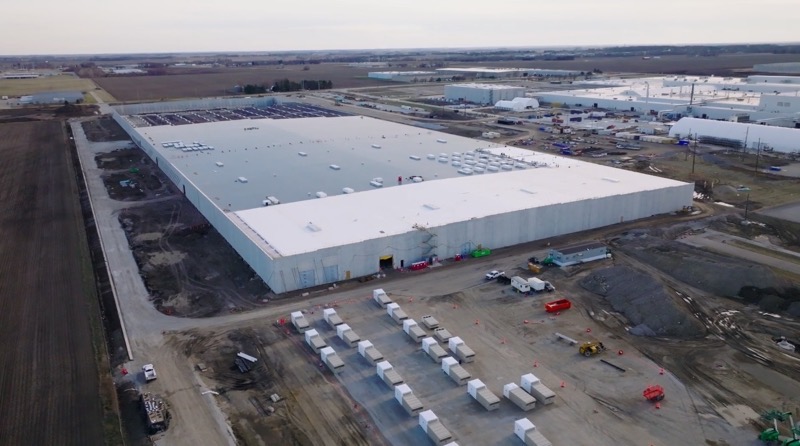Rivian is expanding its manufacturing site in Normal, Illinois, in preparation for the production of its upcoming R2 electric SUV, set to launch in 2026. The company is adding a 1.1 million square-foot building to its existing 4.3 million square-foot facility, which currently produces the R1 series and electric delivery vans. This expansion will allow the plant to increase its production capacity to up to 215,000 vehicles per year.
Despite facing winter weather challenges, construction on the new building is progressing smoothly. The new facility will handle the body assembly, general assembly, and final checks for the R2 model. Additional areas are being added to support painting, battery work, and parts movement within the plant.
Tony Sanger, the VP of Production Facilities at Rivian, mentioned that the construction is ahead of schedule in some aspects. The main new building’s walls and steel framework are nearly completed, with the roof finishing up soon. To expedite the process, Rivian has been utilizing prefabricated materials and redesigning the layout for improved efficiency. For instance, parts painting will now take place in a separate area from the main paint shop, streamlining the overall production process.
In addition to the plant expansion, Rivian has also built a new high-speed test track to replace the old one, which had to be removed to make room for the facility’s growth. Sanger emphasized the importance of swift construction, stating that finishing the buildings quickly will allow teams to start installing equipment sooner and ultimately get the R2 vehicles into customers’ hands faster.
Following the release of Rivian’s Q4 and full-year 2024 earnings in February 2025, the company reported revenue of $1.73 billion for Q4, surpassing expectations. This was driven by 14,183 vehicle deliveries and $299 million in regulatory credits, resulting in the company’s first gross profit of $170 million. However, Rivian still reported a net loss of $743 million for the quarter.
For the full year, Rivian achieved revenue of $5.013 billion with 51,579 deliveries, meeting its target range. Despite the growth from the previous year, the company still recorded a net loss of $4.75 billion. Looking ahead to 2025, Rivian projects 46,000-51,000 deliveries, a modest gross profit, and an estimated EBITDA loss of $1.7-$1.9 billion. The company is supported by $7.7 billion in cash and a significant deal with Volkswagen worth up to $5.8 billion.
Overall, Rivian’s expansion efforts and financial outlook indicate a promising future for the electric vehicle manufacturer as it continues to innovate and grow in the competitive automotive market.

